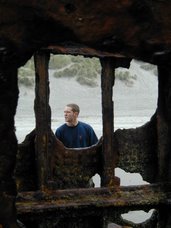
Consequently, "conservatives" are labeled "Fascists" while "liberals" are labeled "Communists." Since Communist Russia was on the side of the Allies, while Nazi Germany and Fascist Italy were the Axis and evil, Communism has been historically seen as positive, while Fascism has been (rightly) seen as evil. Communism was labeled as "Socialist" while Fascism is often associated with Capitalism.
I believe this diagram is constructed with the definition of Communism as "classless, stateless society based on common ownership and control of the means of production and property in general" (Wiki). While this is probably the correct definition of the philosophical teachings of Communism, as practiced, Communism is the exact opposite.
Fascism is usually defined as "a radical, authoritarian, nationalist ideology" that advocates "the creation of a single-party state," that forbids and suppresses "all criticism and opposition to the government and the fascist movement."(Wiki)
I submit that this spectrum is fundamentally wrong. In fact, Communism (as practiced) and Fascism are two sides of the same coin, and that coin is "Stateism."
Stateism is fundamentally opposed to Democracy. It is opposed to individual freedom and individual responsibility. Therefore, I would visualize the spectrum like this:

I could be out to lunch, but that's how I see it.
As for "Capitalism" that is oft maligned, any of these systems could theoretically employ it, depending on who is allowed to control the capital. On the stateism side, the government controls some of the capital (Dem. Socialism), the government controls most of the capital (Socialism), the government only allows those it chooses to have capital (fascism), or the government directly controls the capital (Communism). On the anarchy side, captial is controled by whomever is able to procure it. In Democracy, laws ensure fair tranaction of capital. In full anarchy, capital is procured however individuals decide to procure it.
Right now, the United States is a mixture of all of these. People still have the ability to procure capital, but as you procure more, the government takes a disporportionally larger portion of it, in the form of income, payroll, capital gains, and other taxes and fees. Beginning in the early 1900's and tremendously accelerated during the Great Depression, the Great Society, and other movements, the government has taken over more and more capital (postal service, utilities, passenger rail service, social services, etc.). The government is by far the nation's largest single employer (appx. 22 million people compared to 1.8 employed by WalMart). In fact, government employs more people than any other industry. Recently, we slipped into Fascism by choosing several huge corporations that were "too big to fail" gave them money, and are now beholden to the government.
With so much misinformation about economic and political systems, it seems almost inevitable we will continue the long march to Stateism.
In the 1830's Francis de Toqueville wrote that the totalitarian state would endeavor, "to secure thier [the people's] gratifications, and to watch over their fate. That power is absolute, minute, regular, provident, and mild. It would be like the authority of a parent, if, like that authority, its object was to prepare men for manhood; but it seeks, on the contrary, to keep them in perpetual childhood: it is well content that the people should rejoice, provided they think nothing of rejoicing. For thier happiness such a government willingly labors, but it chooses to be the sole agent and the only arbiter of that happiness; it provieds for their security, forsees and supplies thier necessities, facilitates thier pleasures, manages their principle concerns, directs their industry, regulates the descent of property, and subdivides their inheritances - what remains, but to spare them all the care of thinking and all the trouble of living? ...After having thus successively taken each member of the community in its powerful grasp, and fasioned them at will, the supreme power extends its arm over the whole community. It covers the surface of society with a network of small complicated rules, minute and uniform, through which the most original minds and most energetic characters can not penetrate, to rise above the crowd. The will of man is not shattered, but softened, bent, and guided: men are seldom forced to act, but they are constantly restrained from acting: such a power does not destroy, but it prevents existance; it does not tyrranize, but it compresses, enervates, extinguishes, and stupifies a people, till each nation is reduced to be nothing better than a flock of timid and industrious animals, of which the government is the shepherd." (Democracy in America, 810-811.)



No comments:
Post a Comment